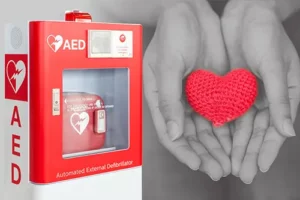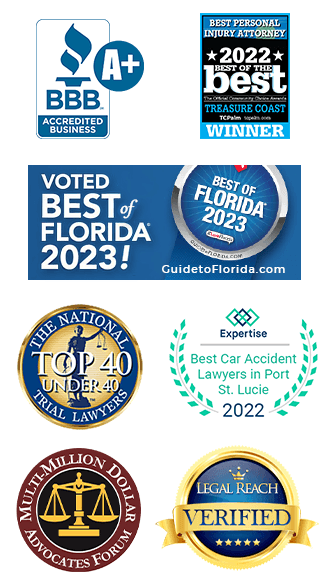

Florida Automated External Defibrillator (AED) Lawsuit Attorney
 Injuries and wrongful deaths have tragically resulted from the non-use or misuse of automated external defibrillators (AEDs). If you or a loved one has suffered from an AED-related incident, you may have the right to compensation. There are laws in Florida that may support your claim. We at the Philip DeBerard personal injury firm can help you find the most effective legal pathways to get the compensation you need and deserve. Talk to Philip DeBerard, Injury Attorney about your AED incident and potential claim. Your consultation with us is free when you call 800-299-8878.
Injuries and wrongful deaths have tragically resulted from the non-use or misuse of automated external defibrillators (AEDs). If you or a loved one has suffered from an AED-related incident, you may have the right to compensation. There are laws in Florida that may support your claim. We at the Philip DeBerard personal injury firm can help you find the most effective legal pathways to get the compensation you need and deserve. Talk to Philip DeBerard, Injury Attorney about your AED incident and potential claim. Your consultation with us is free when you call 800-299-8878.
What is an Automated External Defibrillator (AED)?
An automated external defibrillator is a battery-powered device that can save the life of a person having a cardiac arrest. It delivers an electrical shock to the heart to restore its normal rhythm and trigger it to pump blood again.
Why Certain Places Must Have AEDs Under the Law
The medical community as well as lawmakers support public access to AEDs because sudden cardiac arrests can occur anywhere. In fact, according to a report from the American Heart Association, as many as 356,461 Americans suffer an out-of-hospital cardiac arrest annually, or nearly 1,000 persons each day.
This emergency can quickly become fatal or result in long-term injuries such as permanent brain damage, which is why immediate medical assistance is crucial. Studies show that a person is twice as likely to survive a cardiac arrest if someone, even a non-medical civilian, uses an AED instead of waiting for emergency responders.
If this terrifying emergency happens to you or a loved one, you hope that someone immediately provides life-saving intervention. Federal and state laws promote such interventions, requiring certain establishments to have their own AEDs and encouraging concerned civilians to use it in a cardiac emergency.
Federal and Florida State Laws on AED Access
Here’s a quick look at federal laws and Florida statutes on AEDs in publicly accessible places:
- Assisted living facilities – Florida Statute 429.255 mandates assisted living facilities with 17 or more beds to have a functioning AED in the premises at all times.
- Dental clinics – According to Florida Administrative Code 64B5-17.015, every dentist’s office must have an AED as part of their minimum standard of care.
- Schools – Every public school which is a member of the Florida High School Athletic Association is required to have an operational AED on the school grounds, under Florida Statute 1006.165. School employees or volunteers must have AED training if they could be reasonably expected to use the device.
- State parks – Florida Statutes 258.0165 encourages state parks to have an AED on the premises, and where there’s an AED, employees and volunteers must have AED training.
- Businesses – Florida law encourages business establishments to have their own AED and encourages anyone who might use the device to have the proper training.
- Airports and airplanes – The Federal Aviation Administration requires US airports and domestic flights to have their respective AEDs.
- Federal buildings – The federal Cardiac Arrest Survival Act mandates that every federal building must have an AED in the premises.
- Persons administering AED – The Cardiac Arrest Survival Act also protects persons from civil lawsuits (to a certain extent) if they use an AED on another person having a cardiac emergency. This type of immunity law is commonly called a Good Samaritan law.
When Would an Establishment Could be Liable in an AED-related Injury or Death?
Could an establishment be held liable if a person had a cardiac arrest and there was no functioning AED nearby? The answer to this depends on whether the property had a legal responsibility to have an AED and to have trained persons use the device. Let’s take a look at a few scenarios:
1. When there is no AED in the premises despite requirements.
The law requires certain places to keep an AED, and if an establishment violates this, they could be held liable for unattended cardiac arrests occurring on their property. Further, workers of such establishments are expected to have AED training and be able to administer the device if needed. If they fail this duty, the property could also face liability.
Unfortunately, surveys have shown that half of US employees don’t even know where the AED is at their workplace. Businesses are also reluctant to use the device for fear of being sued for inadvertent AED injuries. It should be noted that “Good Samaritan laws” exist to provide some legal immunity to bystanders who administer AEDs. The bottom line is that if the law requires a property to have and to use a working AED, they must do so or risk facing injury claims.
2. When the property is not required to have an AED.
You’ll notice that some places in Florida are only encouraged to keep an external defibrillator. Without a statutory requirement, it can be difficult to bring a personal injury or wrongful death claim against such a property. However, there may still be legal options to pursue compensation.
With a skilled attorney, you may be able to bring a premises liability claim, asserting that the premises had a duty to address foreseeable risks to their guests. Given the prevalence of sudden cardiac arrests in the US, it could be argued as a foreseeable risk especially in busier properties such as gyms, sports complexes, and workplaces. To determine whether you have a valid claim, don’t hesitate to consult our experienced attorney.
3. When AED is used but causes harm through malfunction.
In some cases, even if the defibrillator is administered properly by a trained individual, it could fail to work as expected. A notable example occurred in 2013 when the US Food and Drug Administration alerted users of Philips HeartStart AEDs that the device might not deliver the life-saving electrical shock. It may also have a defect that falsely indicates it’s ready to use during an emergency.
The FDA said it received over a thousand complaints and adverse event reports about the product. Philips had to recall these devices from all over the country. When a defective device causes harm to a person – or in this case, fails to work as advertised and thus results in further harm – the manufacturer may be held liable. If this happened to you or a family member, speak to our injury attorney about a potential products liability claim.
Contact Philip DeBerard, AED Lawsuit Attorney in South Florida
Filing an AED lawsuit can be complex and daunting. Trust only an experienced lawyer to handle your case. In South Florida, Philip DeBerard has been voted the Best Personal Injury Lawyer on the Treasure Coast by TCPalm, having won over $150 million for their clients and earning the trust of the community. Philip DeBerard, Injury Attorney can provide sound legal advice if you’re considering an AED lawsuit and can represent you in a personal injury or wrongful death case.
Your consultation is free, and we won’t charge you lawyer fees until we’ve won an amount for you. Call 1-800-299-8878 today to schedule your free consultation.
Injured?
Request A Free Case Evaluation




